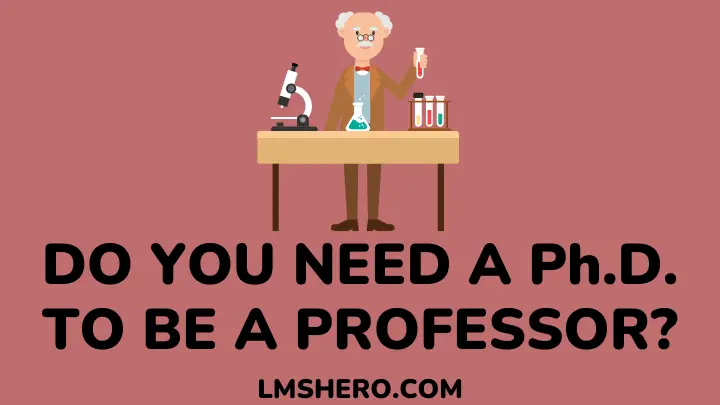Colleges and universities have different ranks to show how much experience one has acquired. Being a professor is one of the highest level one can reach in academics. But do you need a Ph.D. to be a professor?
Yes, you do. All assistant, associate, and full-time professors need a Ph.D. to earn those titles. In addition to that, the professor would also need to have his work published to prove their knowledge.
If you are considering a career as a professor and don’t know how to go about it, then this article is for you. I will discuss the requirements for being a professor and how to become one.
What are the requirements for being a professor?
If you wish to be a professor, there are requirements and basic qualifications you are expected to possess. Some of these requirements include the following;
1. A doctorate in your field
Many institutions or colleges require you to have a doctorate in their field. For example, if you wish to be an economics professor, you need to have a Ph.D. in economics.
2. Enough teaching experience
Another major requirement you should have is teaching experience. You must have valid experience leading or instructing classes or students.
This experience can be gained during masters or doctoral programs. Students under this program are usually encouraged or sometimes even required to handle, lead, or assist with undergraduate classes.
3. A professional certificate
You must have professional certification depending on the field you want to teach in. Usually, in something within your field of study, besides getting a doctoral degree.
For example, a nursing teacher is expected to have a certificate showing that he/she is a registered nurse (RN). In contrast, an aspiring accounting professor may need to be a Certified Public Accountant (CPA).
4. A prominent academic presence or publications
Having a prominent academic presence or publication is vital as a professor. This is because the educational sector is usually very competitive, and having many academic journals gives you that edge over the others.
Not just having different articles under your belt but big or well-known publications such as books. Many colleges even require proof of high-quality ground-breaking research from aspirants.
How can you become a professor?

Now that you have been well-appraised for the requirements of being a professor, what steps must you take to become one?
Below is a step-by-step guide on how to become a professor;
1: Earn a bachelor’s degree
Every professor or educator started as a student in the first place. For you to become a professor, you must first complete the basic educational requirement.
Getting a good grade, at least a minimum of 3.0 GPA, is crucial. This is because most graduate programs require a minimum of a 3.0 undergraduate GPA for admission.
Getting a good grade shows you take education seriously and that you are passionate about learning. This plays a huge role in your path to becoming a professor when you apply for graduate school.
2: Apply for graduate school
Before standing in front of a classroom, it is important that you undergo training in your discipline. Gaining admission into any top graduate school will boost your chances of becoming a college professor.
Ensure you keep your grades or GPA up, as having a low grade can reduce your chances of graduating. The best practice is to get at least Bs in all your classes.
It would also help your course if you utilize your graduate program and become a teaching assistant. This way, not only will you receive payment, but you will also gain experience as a teacher at the post-secondary level.
3. Pass your comprehensive exams
You are expected to take a comprehensive exam to earn a Ph.D. at the end of the program. This exam will show your knowledge of your field.
For some students, especially doctoral students, this exam is oral and written in their primary research areas. While for other students, it requires a portfolio, research paper, and sometimes oral defense.
4. Write a groundbreaking dissertation
After passing the graduate exam, you should write a dissertation which is usually a culmination of your research. Earning a Ph.D. usually requires completing a dissertation.
It would be best if you came up with a unique or groundbreaking dissertation. This is because, when applying for jobs, your dissertation shows that you are innovative and well-disciplined in your field.
5. Go into the job market
After defending your dissertation before the school defense committee, you can enter the academic job market. Or you can apply for postdoctoral positions to help you gain research and teaching experience.
Many educators have found that postdoctoral positions are key in building a resume against applying for full-term jobs.
Is being a professor worth it?
Yes, it is.
According to the U.S. Bureau of Labor Statistics, the average salary of a professor is estimated at $79,000.
Additionally, the U.S. Bureau of Labor Statistics states that the job outlook for professors is excellent. The projection shows the growth rate for professors will increase by 15 percent between 2016 and 2026 and is the fastest among all occupations.
FAQs
Are teachers different from professors?
Yes, they are. A teacher teaches at preschool, elementary, middle, and high school levels, while a professor is an expert.
How long does it take to be a professor?
It could take five to eight years for one to attain the level of a professor.
Who is the youngest professor in the world?
The youngest professor in the world is Alia Sabur. She is an American materials scientist born on February 22, 1989.
Which is the easiest Ph.D. to get?
Some of the easiest fields you can get a Ph.D. easily include psychology, counselor education and supervision, and business management.
Conclusion: Do you need a Ph.D. to be a professor?
You need to have a Ph.D. to become a professor. You must also possess relevant field experience, publications, and certificates.
If you are considering becoming a professor soon, you should start taking the right step toward that. You can see the steps to becoming a professor in this article, and with the right commitment, you can accomplish that.
I hope you enjoyed reading this article; if you did, you should also see if getting a Ph.D. is worth it.
Thanks for reading.






